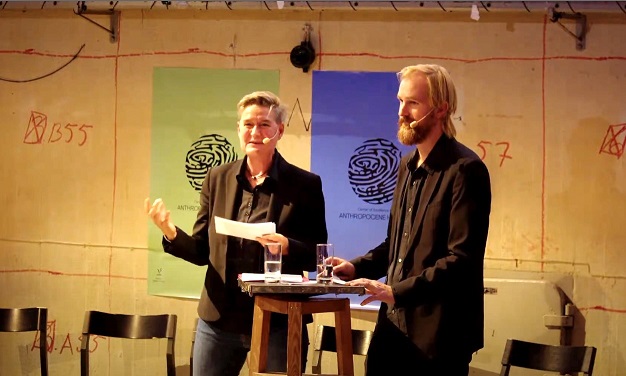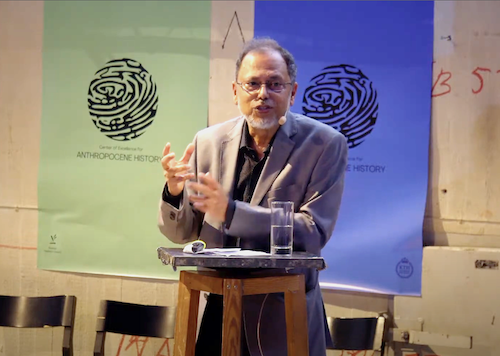Centre for Anthropocene History Officially Launched at KTH

The new Centre for Anthropocene History at KTH has been inaugurated at a public event, opened by co-directors Sabine Höhler and Adam Wickberg with special guests including Indian historian Dipesh Chakrabarty.
The inauguration and launch of the center at the end of September was held in a decommissioned nuclear research facility, a link to the dawn of the nuclear age in the early 1950s, which is the time formally proposed to mark the beginning of the Anthropocene.
Over 100 people in attended in person for the talks and a lively, celebratory mingle with dinner, with many more joining through via livestream throughout the evening (watch the full video below).
The current team of researchers at the centre follow multiple different research directions under the umbrella of Anthropocene History, from extractive mining to the life of microbes to arctic governance.
“We suggest nothing less than to launch Anthropocene History as a new research field. Reaching from the molecular to the planetary and from the deep past to the deep future"
Co-directors Sabine Höhler and Adam Wickberg opened the proceedings, introducing the centre and its founding aims.
“We suggest nothing less than to launch Anthropocene History as a new research field. Reaching from the molecular to the planetary and from the deep past to the deep future, Anthropocenic changes are of a scale that fundamentally affects the environmental conditions for human and other life on the planet.”
The centre aims to break new ground in terms of how the Anthropocene is studied, and the role of history itself in societies, Professor Höhler said.

“Firstly, we want to explore the Anthropocene as an object of study – how to write the history of the Anthropocene? This will need a fundamentally new approach to history that integrates human history and natural history. Secondly, we explore the Anthropocene as a mode of study: How to write history in the Anthropocene? Anthropocene History changes the role of history itself in society into a more active and responsive position that can meet the challenges of our time.”
Professor Dipesh Chakrabarty, a leading historian from the University of Chicago, gave a keynote talk, expanding on the meaning of Anthropocene History and how we must now give attention to both the globe and the planet, which are not the same.
He distinguished between notions of "the global" as in globalisation, which is “human made and humanocentric” and of "the planetary", which “de-centres the human.”
"The global belongs to the recorded history of 500 years. The planetary is about deep history, the geobiological history of the earth system. 'Sustainability' belongs to the global and is human-centric. [Whereas] the planetary is about 'habitability'."
The evening included a live conversation with leading thinkers in field of Anthropocene History and the audience. Including Dipesh Chakrabarty, Sverker Sörlin of the Centre for Anthropocene History at KTH Stockholm, Giulia Rispoli from the Department of Philosophy and Cultural Heritage at Ca' Foscari University in Venice, Thomas Turnbull, historical geographer from the Max Planck Institute for the History of Science in Berlin, Silke Beck, science and technology professor at the Technical University of Munich, and Fredrik Allbritton Johnsson, historian from the University of Chicago.
The centre is funded by five-year a grant from the Swedish Research Council (Vetenskapsrådet).
There are 15 Centers of Excellence in Sweden , five of which are in the humanities and social sciences. According to the Swedish Research Council, the centres “shall carry out ground-breaking research and educational activities around a central theme. The investment in centres of excellence enables new research fields to emerge. The new centres will offer programme activities within an overarching thematic area, and give researchers from different established research disciplines the opportunity to work there for short or long periods."
You can watch the livestream recording of the inauguration event here.
